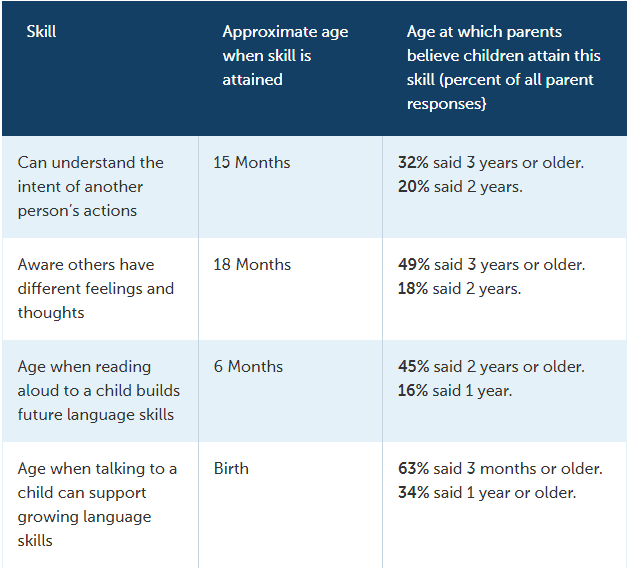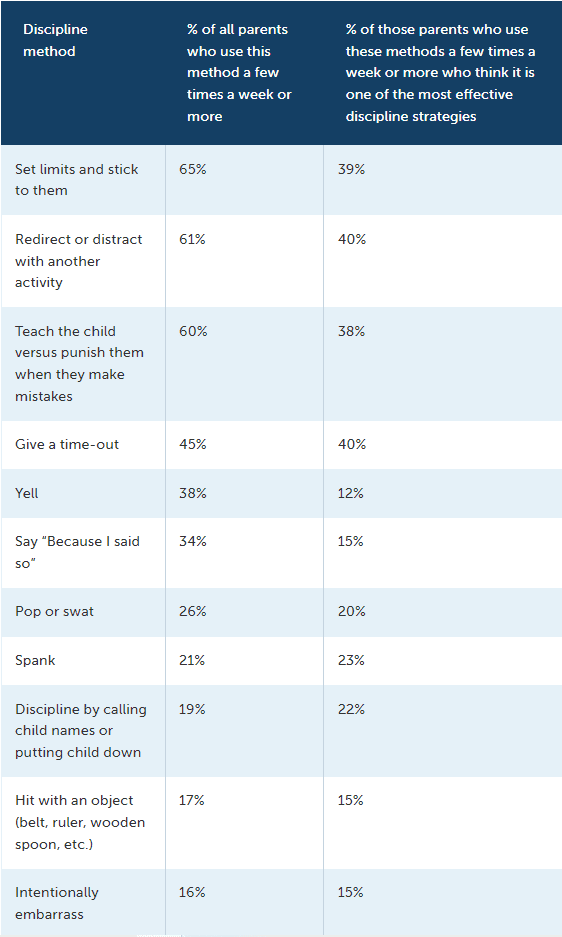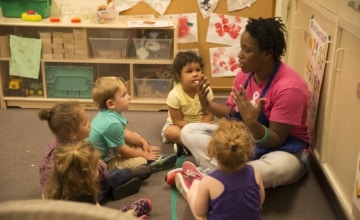We asked moms and dads who are raising this generation of children what they think and how they feel. Explore the key insights from our National Parent Survey.
Studies about the lasting importance of a child’s experiences in the first three years of life, once relegated to scientific or academic journals, are now fueling a broad national conversation about what this growing body of research means for families and communities across the country.
But is this information about early, rapid brain growth—and how it is influenced by the quality of caregiving young children receive—reaching the people who need it most? If we care about babies and toddlers, we need to care about, listen to and meet the needs of their parents. Any effort to nurture and support young children, and to set them up for success in the long term, will be strengthened by helping their parents put this valuable brain science into action.

That’s why ZERO TO THREE, with the support and collaboration of the Bezos Family Foundation, undertook a comprehensive research effort to go directly to parents of young children—largely Millennials and Gen-X mothers and fathers—to gain a clear and in-depth understanding about the challenges they face, the help they seek and how satisfied they are with the support and information they receive.
We conducted 10 in-depth discussion groups in the homes of parents from a wide range of backgrounds (moms and dads; single and married, Caucasian, African-American and Hispanic) in Chicago and Dallas in the summer and fall of 2015. The insights from these groups informed the development of a 50-question internet survey. Available in English and Spanish, the survey was conducted in October 2015, with a nationally representative sample of 2,200 parents of children birth to 5 years.
Explore the key findings from our research.
There Is More That Unites Than Divides Parents
When it comes to attitudes, aspirations and parenting challenges, there is more that unites than divides parents.
Parents of various backgrounds and circumstances show strikingly similar beliefs, at very similar levels of intensity, about the joys and challenges that parenting brings. They share a strong sense that they are good parents, as well as a universal desire to improve their parenting skills.
- Across different races/ethnicities, income and education levels, 80% of parents agree or strongly agree with the statement: “I feel as if I’m a really good parent.”
- At the same time, 87% of parents across the board say they work hard to be an even better parent.
- 91% say parenting is their greatest joy.
- 70% say they feel their life started when they became a parent.
- 73% say parenting is their biggest challenge.
Parents Universally Believe That Parenting Can Be Learned

Across demographic segments, parents want to improve their parenting and seek help in doing so:
- 83% of parents from all backgrounds agree that good parenting can be learned.
- 69% of parents say that if they knew more positive parenting strategies they would use them.
- 54% of parents wish they had more information about how to be a better parent.
Of note is that while they understand the importance of the first 5 years of a child’s life, 58% of parents find this notion both motivating and terrifying to varying degrees. 1 in 4 parents feel equally terrified and motivated.
The importance of the early years is both motivating and terrifying to parents.

Dads Are More Than Babysitters
They love being involved fathers, and want—and deserve—more credit. The vast majority of dads, across all demographic segments, are passionate about the positive role that fatherhood plays in their lives.
- 90% of dads say being a parent is their greatest joy.
- 73% say their lives began when they became a dad.
- 54% of dads say “I love you” more, 47% participate more in playtime and 47% read more to their child than they recall their own parents did.
- 63% of dads agree that “Dads don’t get enough credit for their involvement in raising and caring for young children.” 64% of moms also agree with this statement, too.

Still, many dads report feeling frustrated and shut out:
- 40% of dads (versus 17% of moms) say that “I’d like to be more involved in raising my child but my parenting partner interferes with my involvement.”
- 43% of dads (versus 16% of moms) say that “My parenting partner often takes too much control of parenting.”
There Is a “Missing” First Year
While parents have a general understanding that what happens in a child’s early years can last a lifetime, many don’t realize at what age babies and toddlers can begin to feel complex emotions. Parents also don’t realize how deeply they can be affected by the way parents interact with them in the first months of life. A notable portion of parents miss the mark by months, or even years.
The time of most rapid brain development occurs during the first 3 years. While 63% of parents identified this correctly, more than 34% said that the time of most rapid brain growth is 3 to 5 years, a significant underestimation of the importance of the earliest years.
Parents overall consistently underestimate just how early children can be affected by some critical experiences:
- When asked at what age the quality of a parent’s care has a long-term impact on a child’s development, 50% of parents said this begins at 6 months or older, when in fact it starts at birth; 57% of parents say this begins at 3 months or older.
- When asked to identify the age at which children can begin to feel sad or fearful, 42% of parents say one year or older. In fact, this happens as early as 3-5 months. The majority of parents—59%—believe this begins at 6 months or older.
- Nearly half of parents think that reading to children starts to benefit long-term language development about a year and a half later than it actually does: 45% say the benefits start at 2 years or older. In reality, benefits begin at about 6 months.
- 34% of parents believe that talking to children starts to benefit their language skills at a year old or later, when in fact it begins at birth. 63% of parents say the benefits of talking begin at 3 months or older.
There Is an Expectation Gap When It Comes to Understanding Children’s Capabilities
About half of parents believe that children are capable of self-control and other developmental milestones much earlier than they actually are.
- 43% of parents think children can share and take turns with other children before age 2, and 71% believe children have this ability before age 3. In fact, this skill develops between 3 to 4 years.
- 36% of parents surveyed said that children under age 2 have enough impulse control to resist the desire to do something forbidden, and 56% said this happens before age 3. In fact, most children are not able to master this until between 3.5 to 4 years of age.
- 47% of parents want to learn more about how and when children develop self-control. 42% want to know more about what skills to expect at different ages.
Parents were asked to choose at what age on average (birth, 3 months, 6 months, 1 year up to 8 years) a child is capable of the following skills:

Parents Face a Discipline Dilemma
Parents are equally likely to view discipline as a way to nurture their children as it is a way to stop bad behavior. While parents use a range of discipline strategies, many are not seen as the “most effective” approach.
- 68% of parents are as likely to say that they use discipline to nurture. An equal number of parents—68%—use discipline to stop bad behavior. 65% view discipline as a way to protect their children.
- 57% of parents struggle with figuring out the most effective way to discipline.
- 42% of parents say they do not want to yell or raise their voice as quickly as they do, and 35% don’t want to lose their temper so fast.
The chart below shows the percentage of parents who say they use these discipline strategies frequently (once a day or more or a few times a week) and whether they think each of these methods is among the most effective.

Parents say that that harsh discipline strategies, like spanking and yelling, are not the most effective, including the parents who use these methods frequently.
- 30% of parents say: “I spank even though I don’t feel okay about it.”
- 69% of parents recognize that “shaming (verbally putting a child down or calling him or her names) can be as harmful as physical abuse.”
- Of those parents who say they spank their children frequently—several times a week or more— fully 77% do not count it as “one of the most effective methods of discipline.“
Parents Are Drawing a New Roadmap
While moms and dads say that the way they were raised is a primary influence on their own parenting, many say they are more positive and present and use fewer harsher discipline tactics that their own parents used with them.
- The overwhelming majority of parents—9 in 10—report that the way they were raised is a key influence on their own parenting, and 6 out of 10 say that what they learned from their parents is useful.
- Still, roughly half of all millennial and Generation X parents see themselves as being more positive and present, and using less harsh disciplinary strategies with their own children than they recall their own parents using with them.
Parents were asked to indicate whether they use each of the following approaches more, less or as much as their own parents when they were children:


There Is a Trust Gap
Parents want advice, but are overwhelmed by sources of help and underwhelmed by the quality of what they’re getting. Just because parents turn to a particular resource for guidance doesn’t mean it’s useful. For example, 84% turn to articles specifically aimed at helping parents, but only 49% find them helpful.
- Parents do want guidance from child development professionals. 54% of parents say they would like information from a “special web site or blog from child development experts.”
- However, 58% of moms and dads say there is so much parenting information available that it’s hard to know who to trust.
- 63% of parents overall say “I am skeptical of people who give parenting advice and recommendations if they don’t know my child and my situation specifically.”
- 47% of dads and 29% of moms say they don’t know where to find information they can trust.
How often do you get parenting advice, information or guidance from each of the following and how helpful do you find these resources?

Almost All Parents Feel Judged, Almost All the Time
Moms are more likely to feel judged than dads are, with one important exception: Dads feel more judged by their co-parents than moms do.
- 90% of moms and 85% of dads feel judged. 46% of moms and 45% of dads say they feel judged all the time or nearly all the time.

Parents report that they feel most judged by strangers in the community, with 48% of moms and 24% of dads feeling this way. 33% of moms, versus 19% of dads, feel judged by other parents.
The only time dads say they feel more judged for their parenting than moms do is when judgment comes from their child’s other parent (22% of dads versus 17% of moms).
Half of Parents Aren’t Getting the Support They Need When They Feel Overwhelmed or Stressed
When parents are overwhelmed or stressed, they lack adequate support, and some get no support at all:
- Almost half (48%) of all parents don’t feel they are getting the support they need when they feel stressed. Moms are more likely (57%) to say they have inadequate support than dads (39%).
- 54% of single parents who have no other co-parent involved in their child’s care don’t get the help they need.
- 8% of parents overall say they get no support at all.
Thinking about the times when you feel overwhelmed or stressed as a parent, do you get the support you need?

The fact that fully half of parents say they aren’t getting the support they need presents a risk and an opportunity. We know from decades of research that, especially during times of stress, the more parents feel supported, the better able they are to provide a caring and healthy environment for their children. Those children then fare better on a variety of academic and social well-being measures in the long-term.
Parents Want More from the Media
They welcome information about parenting in all kinds of content from expert-informed websites to portrayals of typical parenting challenges and helpful solutions incorporated more broadly into popular media. 54% of parents want information from a website or blog from child development experts. Parents want this information delivered directly to them, via email (39%), in apps (34%) or text message (18%).
The majority of parents want TV shows to provide guidance:
- 64% of parents say they sometimes or frequently get parenting advice, information or guidance from portrayals of parenting on TV.
- 64% of parents agree that they would like to see more examples on TV of parents handling a challenging situation in a postiive way.
- 66% want to see more TV shows portraying the realities of parenting young children.
Download the PDF for a list of citations and a description of the methodology. View the overview and full report.




